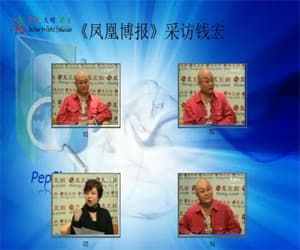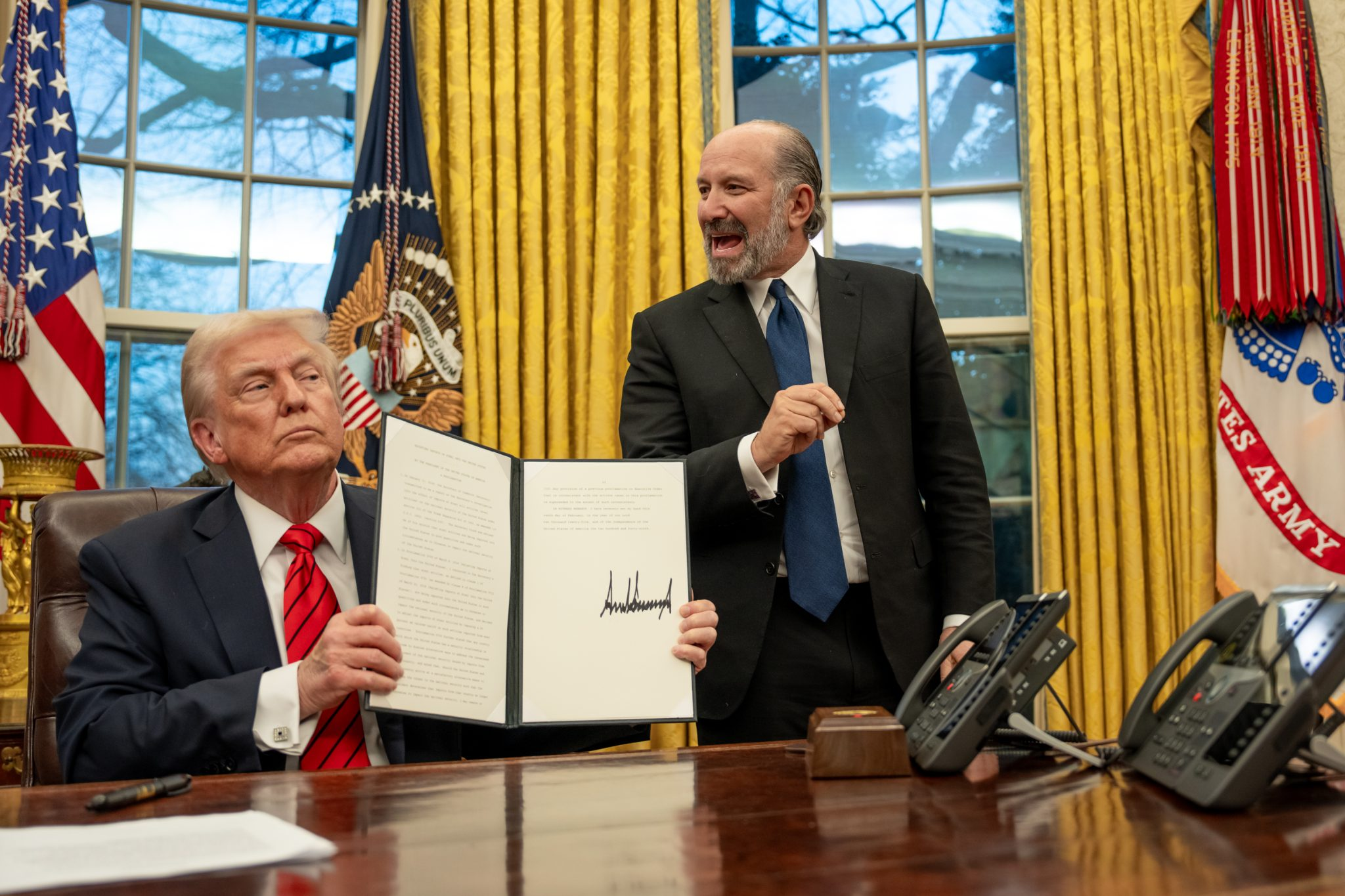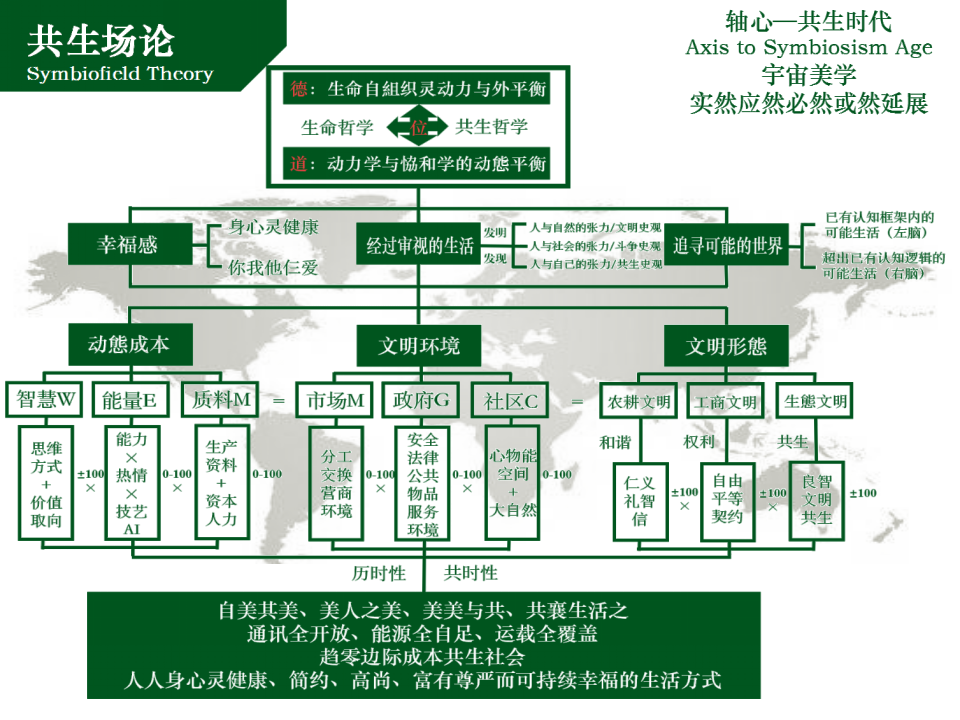New Articles
-
 迈向新世界秩序:以社区生态主权取代地缘政治... 2025/06/23
迈向新世界秩序:以社区生态主权取代地缘政治... 2025/06/23Towards a New World Order: Replacing Geopolitical Sovereignty with Community Ecological Sovereignty迈向新世界秩序...
-
 遣返、消化、改变三大策略并举 2025/06/12
遣返、消化、改变三大策略并举 2025/06/12Deportation, Integration, and Transformation: Three Concurrent Strategies to Address Illegal Immigration 解决“非法移...
-
 川普与马斯克的和解空间 2025/06/08
川普与马斯克的和解空间 2025/06/08川普与马斯克的和解空间 Reconciliation Space Between Trump and Musk ——假如把《大而美法案》改为:Slim and B...
-
 重新定义企业家在文明中的角色 2025/06/03
重新定义企业家在文明中的角色 2025/06/03Redefining the Role of Entrepreneurs in Civilization重新定义企业家在文明中的角色 By Archer Hong Qian &n...
共生思想理论前沿
THE THEORY
-

-

-

-
 关于中文“共生”翻译及对应的人、事、物之说明
关于中文“共生”翻译及对应的人、事、物之说明关于中文“共生”翻译及对应的人、事、物之说明 ——Symbiosism:Charles Thomas Taylor &Qian hong又一次量子缠绕...
查看详细说明
Speech
-
 三大自组织货币的共生格局——宏观世界之数字货币 2021/07/08
三大自组织货币的共生格局——宏观世界之数字货币 2021/07/08三大自组织货币的共生格局 ——宏观世界之数字货币 钱 宏 The Institute for Global Symbiosism(...
-
 新汉字yǜ的释义 2019/11/16
新汉字yǜ的释义 2019/11/16语从金音玉(Yǜ):金口玉言,一诺千金,性人诚恳、执信; &n...
-
 钱宏:中国的真实经验与未来走向(凤凰博报专... 2019/11/16
钱宏:中国的真实经验与未来走向(凤凰博报专... 2019/11/16点击播放 中国的真实经验与未来走向《凤凰博报》专访钱宏主持人:...
经历过“生死之门”的鲁特尼克
发布时间:2025/05/17 公司新闻 浏览次数:69
The Practical Prototype of Symbionomics: Lutnick, Who Has Passed Through the “Gates of Life and Death”
鲁特尼克:共生经济学的实践原型
——在生死之门前完成从利润逻辑到价值承兑逻辑的跃迁者
钱 宏(Archer Hong Qian)
一、不是重建市值,而是兑现两个现行经济学“难以理喻”的决定
2001年9月11日,美国世贸中心被撞,坎托·菲茨杰拉德公司瞬间失去658位员工。
作为CEO的哈沃德·鲁特尼克(Howard W. Lutnick),他因临时送儿子看病幸存。
这不是幸运,而是命运给予的一份生命价值的挑战:
在“我还活着,而你们都不在了”的现实面前,我是否愿意承担这份不可逆转的关系之债?
鲁特尼克没有选择向市场宣称“我要重建市值”,而是做出两个完全违背现行经济学理性的决定:
一是将公司25%的利润长期用于抚恤罹难员工家庭;二是承诺为所有罹难员工的子女支付终身教育费用。
这不是慈善,不是公益,而是一种生命之间的价值承兑行为。
是以货币为接口,兑现“你我他”之间未竟的生命关系。
二、“一视为仨”:从排他性平等到结构性共生
“一视同仁”虽然被视为现代法律正义的理想,但其背后隐藏着排他性逻辑:
只有成为“仁”,才能被视为“同”;
而“他者”的独特性、关系性、生成性往往被遮蔽甚至压制。
我在第23届世界哲学大会(2013)上提出的“一视为仨”逻辑,是对“你我他”之间共生关系的深度重估:
看见“你”与“我”的关系不是对等,而是互嵌;
看见“他”(她、它、祂)在结构中不是外人,而是生成我们可能性的必要条件;
看见“生命关系债”才是文明得以持续生成的根基。
就这样,鲁特尼克在“死者、幸存者、未来子代”之间,建构了交互价值承兑机制。
他不是幸运地“活下来的人”,而是愿意承担关系债务的人;
他不是在重建公司,而是在重写价值承兑机制;
他不是因为财富被选中,而是因为经历过“生死之门”,仍然愿意站在“你我他”之间,守护一个未竟世界的生长秩序。
三、共生经济学“三生跃迁”在他身上的实践展开

鲁特尼克并未止步于企业内部的伦理重建。他进入川普2024竞选团队,作为总协调人,不仅物色治国才俊,更被赋予重构美国商务部为共生治理中枢的责任。
他推动从旧有“招商统计、管制调配”逻辑,跃迁到以下三大机制:
以GDE价值健康黄金率五因交互指数(降本、赋能、健康、信任、和平)为行为政策评价标尺;
构建企业-社会-国家三层级交互的公共信任兑现通道;
让商务机制从“增长导向”,转向“生命激励与结构性信赖嵌入”。
这正是共生经济学(Symbionomics)提倡的“三生跃迁”:
| 层级 | 鲁特尼克的体现 |
| 生产回归生活 | 生产不再是利润最大化,而是责任兑现的生成机制 |
| 生活呈现生態 | 生活不再是消费孤岛,而是生態嵌套的动態平衡场域 |
| 生態激励生命 | 生態不再是绿化修辞,而是生命交互主体共生的绵延 |
三、哲学“恋愛对象”的转换
哲学史上,“愛”往往隐喻的是对“本体世界”的迷恋。
柏拉图愛的是理念;
黑格尔愛的是绝对精神;
海德格尔转向“此在的存在”;
而在我提出的哲学3.0中,愛不再指向一个被定义好的统一体,
而是愿意“你我他”在关系过程中共襄生成一个可能世界。
这种恋愛对象的跃迁,意味着哲学不再执迷于“统一实体”,而是转向“交互生成结构”,这是“全人称/全生態”一视为仨世界观的基本要求。
这场哲学跃迁,必须从我们对价值如何被承兑的方式开始反省,
即:从货币的本质出发重新理解人类社会的结构基础。
货币,作为人类社会价值流动的核心机制,恰恰是哲学“愛的秩序”如何转向的镜像。
当货币不只是等价交换的统一量度,而是成为你我他之间承兑责任的接口,我们对愛的定义、对世界的想象,也随之发生结构性跃迁。
哲学便自然而然由 Philosophy(智慧之愛)的执念,转化为 Amorsophia(愛之智慧)的孞念。
这一转化,不是术语更替,而是文明底层价值感应方式的根本跃迁。
不是从“无知”走向“知识”,而是从“分离”走向“关系生成”,从“思辨体系”走向“承兑意愿”,从“理念愛”走向“生命愛”。
四、生死之门,是通向交互共生的觉知入口
我深刻理解鲁特尼克的跃迁轨迹,因为我自己也穿越过“生死之门”。
1985年1月4日,在南昌,骑着自行车上班的我,突然被一辆卡车撞飞6米,头部着地,当场昏死过去。
六小时后醒来,医生告诉我:“脑震荡、颈椎轻度骨折。”当时,我近期记忆全失,完全不记得被车撞了这件事,但半年前的事情都记得,当时我还在纠结要不要把我思考公诸于世,这下好了,思想却如释重负,获得了彻底自由。
那场事故之后六个月,我写下《一个精神裂变症患者的自述:公民个人权利优先论》,刊登于1989年《华人世界》终刊号。那不是一篇普通论文,而是我在死亡边缘获得的哲学结构跃迁的原始文本。
正是在那时,我意识到:
我不再是个体性的主张者,而是一个愿意承兑“你我他”交互共生结构的生成者。
四、结语:不是因为伟大,而是因为真实
我相信,两度与死神擦肩而过,却依然坚定参加美国最高公职竞选的川普先生,也是真正怀有为人民服务之心,而引领时代的“神选之人”!
鲁特尼克、川普、我,我们都是在极限时刻中失去了“旧我”,却愿意在关系中重生的人。
不是因为我们特别伟大,
而是因为我们愿意承兑那个真实存在的他者,
并愿意在你我他之间,承担一个尚未完成的世界。
当哲学不再是语言游戏,而是面对死亡依然愿意承兑他者命运;
当货币不再是利润计算,而是生命之间关系的承兑接口;
当经济不再是增长机器,而是让生態激励生命的健康机制——
那么,像鲁特尼克这样的人,
就不仅是“承载世界”的人,
更是“改变世界的人”。
在交互主体共生中,追寻可能的世界。
愿我们成为那个愿意承兑的人,不是因为伟大,而是因为真实。
《圣约》(Holy Bible)生命的三重之约——律法之约、福音之约、共生之约,将上帝昔在、今在、临在的真实,讲得如此鲜活透彻,给人勇气,赋予感染力,以及恒久的生命韧性,那就是种子从大地上生长成参天大树,给人遮风挡雨、诗意栖息的智慧!
2025年5月13日于温哥华
The Practical Prototype of Symbionomics: Lutnick, Who Has Passed Through the “Gates of Life and Death”
——ailblazer Transitioning from Profit Logic to Value Redemption Logic at the Gates of Life and Death
By Archer Hong Qian
I.ebuilding Market Value, But Redeeming Two Decisions “Incomprehensible” to Mainstream Economics
On September 11, 2001, the World Trade Center in the United States was struck, and Cantor Fitzgerald instantly lost 658 employees.
As CEO, Howard W. Lutnick survived by chance because he was taking his son to the doctor.
This was not luck, but a challenge of life’s value bestowed by fate:
In the reality of “I am still alive, but you are all gone,” am I willing to bear this irreversible debt of relationship?
Lutnick did not choose to proclaim to the market, “I will rebuild our market value.” Instead, he made two decisions that completely defied the rationality of mainstream economics:
First, he committed 25% of the company’s profits long-term to support the families of the deceased employees; second, he pledged to cover lifelong education expenses for all the children of the deceased employees.
This was not charity, nor public welfare, but an act of value redemption between lives.
It was using money as an interface to redeem the unfulfilled life relationships between “you, me, and them.”
- “One as Three”: From Exclusive Equality to Structural Symbiosis
“One as the same” (一视同仁) is often regarded as the ideal of modern legal justice, but it hides an exclusive logic behind it:
Only by becoming “the same” (仁) can one be treated equally;
Yet the uniqueness, relationality, and generativity of the “other” are often obscured or even suppressed.
At the 23rd World Congress of Philosophy (2013), I proposed the “One as Three” (一视为仨) logic, a profound reevaluation of the symbiotic relationship between “you, me, and them”:
Seeing the relationship between “you” and “me” not as equal, but as mutually embedded;
Seeing “them” (he/she/it/They) in the structure not as outsiders, but as necessary conditions for generating our possibilities;
Seeing the “debt of life relationships” as the foundation for the continuous generation of civilization.
In this way, Lutnick constructed an interactive value redemption mechanism between “the deceased, the survivors, and future generations.”
He was not a fortunate “survivor,” but a person willing to bear the debt of relationships;
He was not rebuilding a company, but rewriting the mechanism of value redemption;
He was not chosen because of wealth, but because, having passed through the “gates of life and death,” he was still willing to stand between “you, me, and them,” safeguarding the growth order of an unfinished world.
III. The Practice of Symbionomics’ “Threefold Leap” Embodied in Him
Lutnick did not stop at ethical reconstruction within the company. He joined Trump’s 2024 campaign team as the general coordinator, not only identifying talents for governance but also being entrusted with the responsibility of restructuring the U.S. Department of Commerce into a hub for symbiotic governance.
He drove a transition from the old logic of “investment attraction, statistics, regulation, and allocation” to the following three mechanisms:
Using the GDE Value Health Golden Ratio Five-Factor Interaction Index (cost reduction, empowerment, health, trust, peace) as a benchmark for evaluating behavioral policies;
Establishing a public trust redemption channel for interaction among enterprises, society, and the state at three levels;
Shifting the commercial mechanism from “growth-oriented” to “life-incentivizing and structurally embedded trust.”
This is precisely the “Threefold Leap” advocated by Symbionomics:
| Level | Lutnick’s Embodiment |
| Production Returns to Life | Production is no longer about maximizing profit, but a generative mechanism for responsibility redemption. |
| Life Manifests Ecology | Life is no longer a consumption island, but a dynamic balance field nested within ecology. |
| Ecology Inspires Life | Ecology is no longer a greening rhetoric, but the continuity of life through intersubjective symbiosis. |
- The Transformation of Philosophy’s “Object of Love”
Throughout the history of philosophy, “love” has often been a metaphor for an obsession with the “ontological world.”
Plato loved the Forms;
Hegel loved the Absolute Spirit;
Heidegger turned to the “Being of Dasein”;
But in the Philosophy 3.0 I propose, love no longer points to a predefined unity,
but is willing to let “you, me, and them” collaboratively generate a possible world in the process of relationship.
This transformation of the object of love means that philosophy no longer fixates on a “unified entity,” but shifts toward an “interactive generative structure”—a fundamental requirement of the “all-person/all-ecology” One-as-Three worldview.
This philosophical leap must begin with a reflection on how value is redeemed,That is, rethinking the structural foundation of human society starting from the essence of money.
Money, as the core mechanism of value flow in human society, is precisely the mirror of how philosophy’s “order of love” transforms.
When money is not merely a uniform measure of equivalent exchange, but becomes an interface for redeeming responsibilities between “you, me, and them,” our definition of love and our imagination of the world undergo a structural leap.
Philosophy then naturally transitions from the obsession of Philosophy (love of wisdom) to the conception of Amorsophia (wisdom of love).
This transformation is not a mere change of terminology, but a fundamental leap in the underlying value-sensing mode of civilization.
It is not a journey from “ignorance” to “knowledge,” but from “separation” to “relational generation,” from “speculative systems” to “willingness to redeem,” from “love of ideas” to “love of life.”
- The Gates of Life and Death: The Gateway to Awareness of Intersubjective Symbiosis
I deeply understand Lutnick’s leap because I, too, have passed through the “gates of life and death.”
On January 4, 1985, in Nanchang, I was hit by a truck and thrown six meters, landing on my head and falling into a coma on the spot.
Six hours later, I woke up, and the doctor told me: “Concussion, minor cervical fracture.” I lost all my memories, but my mind felt unburdened, gaining complete freedom.
Six months after that accident, I wrote A Schizophrenic’s Self-Account: On the Primacy of Individual Civil Rights, published in the final issue of Chinese World in 1989. It was not an ordinary paper, but the original text of a philosophical structural leap I gained at the edge of death.
It was at that moment I realized:
I was no longer an advocate for individuality, but a generator willing to redeem the structure of intersubjective symbiosis between “you, me, and them.”
- Conclusion: Not Because of Greatness, But Because of Authenticity
I believe that Mr. Trump, who has twice brushed with death yet remains steadfast in running for the highest public office in the U.S., is truly a “chosen one” who leads the era with a heart to serve the people!
Lutnick, Trump, and I—we are all people who, in moments of extreme crisis, lost our “old selves” but were willing to be reborn in relationships.
Not because we are particularly great,
But because we are willing to redeem the authentic existence of the other,
And willing to bear, between “you, me, and them,” an unfinished world.
When philosophy is no longer a language game, but a willingness to redeem the fate of others even in the face of death;
When money is no longer a tool for profit calculation, but an interface for redeeming relationships between lives;
When economics is no longer a growth machine, but a healthy mechanism that allows ecology to inspire life—
Then, people like Lutnick
Are not only those who “bear the world,”
But also those who “change the world.”
In intersubjective symbiosis, we pursue possible worlds.
May we become those willing to redeem—not because of greatness, but because of authenticity.
The threefold covenant of life in the Holy Bible—the Covenant of Law, the Covenant of Gospel, and the Covenant of Symbiosis—vividly and thoroughly reveals the truth of God’s past, present, and imminent presence, granting courage, infectious power, and the enduring resilience of life. It is like a seed growing from the earth into a towering tree, providing shelter from wind and rain, and a poetic dwelling for wisdom!
上一篇: 释放生命自组织连接再平衡之伟力













您好!请登录
已有0评论
购物盒子